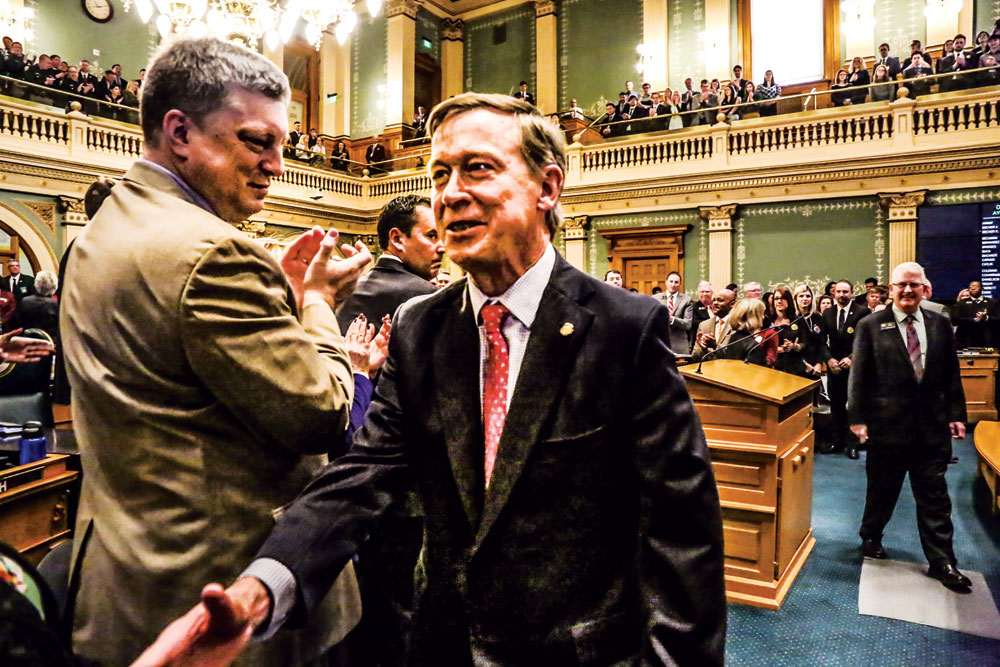
John Hickenlooper, now U.S. senator-elect, is pictured here on the day he gave his last state-of-the-state address to state legislators and other dignitaries. As a U.S. Senate candidate, Hickenlooper emphasized his strength as a coalition builder.
 Fifty years ago, Colorado was quite “red,” politically. The governor, John Love, was a Republican. So were three of the four other statewide elected officials and both U.S. senators. The U.S. House was an anomaly; three of the four—yes, just four—were Democrats. Boulder’s district was represented by a Republican; Colorado Springs by a Democrat.
Fifty years ago, Colorado was quite “red,” politically. The governor, John Love, was a Republican. So were three of the four other statewide elected officials and both U.S. senators. The U.S. House was an anomaly; three of the four—yes, just four—were Democrats. Boulder’s district was represented by a Republican; Colorado Springs by a Democrat.
Fifty years was so long ago “red” still was identified with left-leaning politics: Mao Tse Tung’s little red book; the Red Army; “pinkos,” in Sen. Joseph McCarthy’s crusade against Communist infiltration.
Somehow, “red states” became those United States that tended to vote Republican. The liberal, Democratic-leaning states turned blue, at least in the cartography of network television. Colorado evolved from mostly red to purplish and then to sort of a robin’s egg blue and finally, this year, to a deeper blue hue.
We entered 2020—a leap year, an election year, a year when we had anything but 20/20 vision—with the pundits predicting a “blue tsunami.” After four years of President Trump’s bluster and bullying, his refusal to give an inch to his political adversaries, there was supposed to be a total repudiation—not just of him—but of his Republican apologists, too.
It didn’t happen.
Yes, former Vice President Joseph Biden won as many electoral votes as President Trump won in 2016 and is almost certain to be sworn in on January 20, 2021, unless the Trump regime somehow manages to find enough dubious legalisms to resuscitate itself.
But if the national results were muddled, Colorado’s were clear. The president lost Colorado by some 13 percentage points, after Hillary Clinton had won the state by 5 points in 2016. And former Gov. John Hickenlooper defeated incumbent Republican U.S. Sen. Cory Gardner by 9 points.
Colorado has gotten more solidly Democratic as the Republicans kept going further right. In fact, both parties nationally seem to be drifting further apart, toward the fringes instead of the center.
That leftward drift probably led to the Democrats’ underperformance nationally. Although they gained seats in the Senate; there’s no path to a majority (except with the vice president’s vote), even with the double runoff happening in Georgia. And the “blue” party even lost a few seats in the U.S. House. It seems the anti-racism demonstrations against police killings went too far for some voters’ tastes, and while a majority agreed with the objectives, they rejected the sometimes-violent tactics in that a minority indulged in.
There’s ample evidence of the wish to return to a milder form of politics. In Colorado and nationally, voter registrations for the major political parties aren’t growing as fast as registrations of independent voters.
In 2012, the year Barack Obama was re-elected in Colorado and nationally, Colorado’s voter registration was 34% Republican, 33% Democrat, and 32% unaffiliated (third parties make up the rest). By the time this year’s election rolled around, Democrats had added 292,000 voters and 2.6 percentage points to their share of the state’s electorate; Republicans added 65,000, a 6.7-point loss in their share; and unaffiliated voters had grown by 679,000 voters, an amazing 8.7% spike in their share. Today the breakdown is roughly 30% Democrats, 28% Republicans and 40% unaffiliated, with third-party registrations accounting for the rest.
In Colorado and elsewhere, those independents are the ones who swing elections. And they aren’t wing nuts. It may be that they have grown tired of candidates who promise to “fight” for their pet proposals. Enough with the fighting, they say; get something done.
In that respect, Senator-elect Hickenlooper and President-elect Joe Biden appear to be soul brothers. They emphasize their strength at coalition-building and recognize that compromise is not a dirty word. Compromise is how progress is made—incrementally, not explosively.
That may be the lesson to take away from the voting in Colorado and nationally. Given the mixed results, and the most-likely-mixed control of Congress, Democrats would be wise to avoid the mirror image of what the Republicans have done over the past several election cycles: moving further to the fringe in an effort to gain strength. It eventually stops working—and always exacerbates division.
Fred Brown covered politics for almost 50 years as a reporter, editor and columnist for The Denver Post. He now teaches media ethics at the University of Denver.


Let Rep Dave Williams read this. That guy said on 9 news last month he was afraid he’d have to compromise more with democrats. Like it’s a bad thing to appeal to the majority of middle-of-the-road voters. They don’t work for themselves, they work for us.